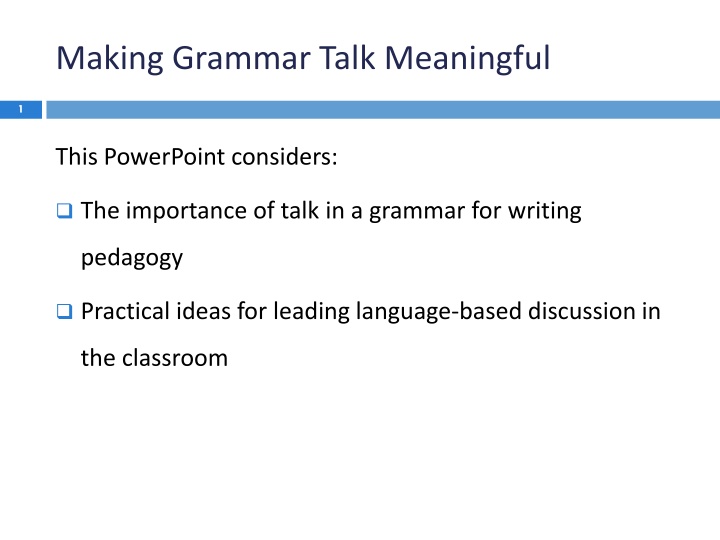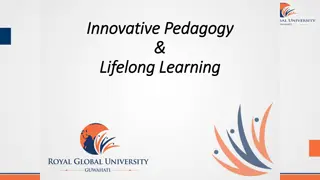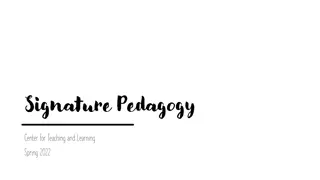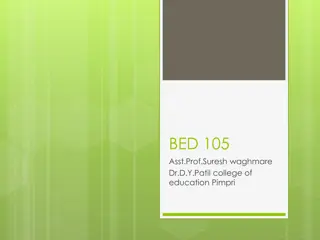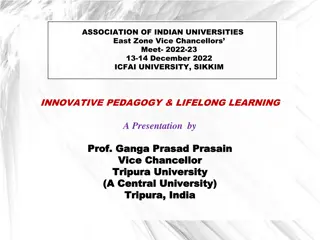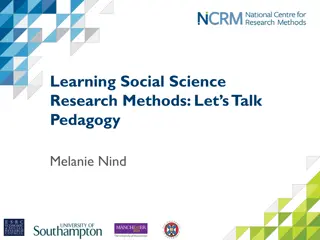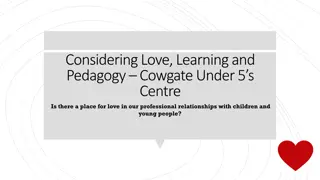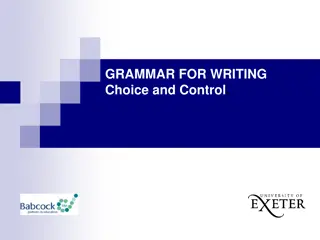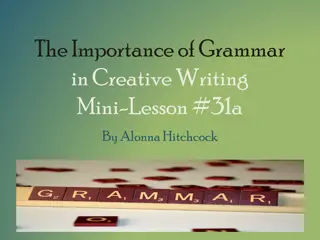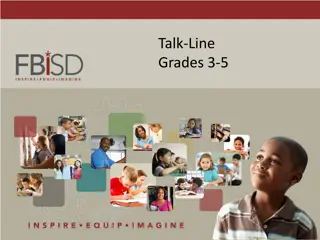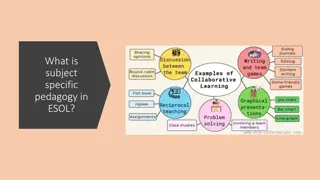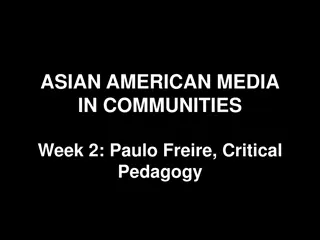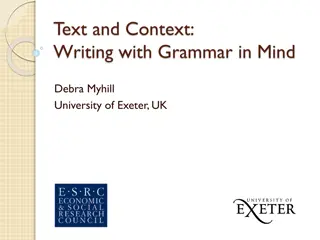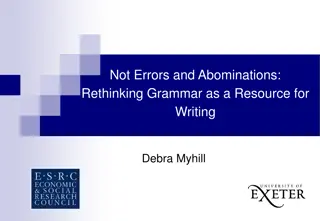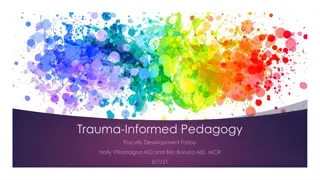Engaging Grammar Talk for Writing Pedagogy
This PowerPoint explores the importance of talk in grammar for writing pedagogy, providing practical ideas for facilitating language-based discussions in the classroom. It delves into topics such as expanded noun phrases and descriptive language through engaging classroom activities and examples from literature like "Arthur, High King of Britain."
Download Presentation

Please find below an Image/Link to download the presentation.
The content on the website is provided AS IS for your information and personal use only. It may not be sold, licensed, or shared on other websites without obtaining consent from the author.If you encounter any issues during the download, it is possible that the publisher has removed the file from their server.
You are allowed to download the files provided on this website for personal or commercial use, subject to the condition that they are used lawfully. All files are the property of their respective owners.
The content on the website is provided AS IS for your information and personal use only. It may not be sold, licensed, or shared on other websites without obtaining consent from the author.
E N D
Presentation Transcript
Making Grammar Talk Meaningful 1 This PowerPoint considers: The importance of talk in a grammar for writing pedagogy Practical ideas for leading language-based discussion in the classroom
One kind of grammar talk 2 Can anyone tell me what an expanded noun phrase is? A noun phrase is a phrase with a noun at its head. A phrase is a group of words that are grammatically connected so that they stay together, and that expand a single word, called the head . The phrase is a noun phrase if its head is a noun. If the head is a verb, the phrase is called a clause. (from the NC Grammar Glossary) Write a noun phrase containing at least three words to complete the sentence below. Remember to punctuate your answer correctly. -------------------------------------------------------- was preparing for an important athletics competition. (From 2017 KS2 test of English grammar, punctuation and spelling)
Look at the noun phrases that are used to describe the Nowhere Emporium. How well do they match the picture on the front cover of the book? the shop from nowhere hidden secrets bricks the colour of midnight bricks that shimmered and sparkled under the glow of the gas streetlamps a golden gate so fine and intricate that some wondrous spider might have spun it a glimmer of movement in the entranceway the door to a world of breathtaking magic and looming danger From the way it s described, would you want to go inside this shop? What objects do you think you might find inside? Use noun phrases to describe one of them so we can imagine it too. and another 3
One kind of classroom talk about grammar 4 Context: Y6, using expanded noun phrases to write a description of a dragon, triggered by reading Michael Morpurgo s Arthur, High King of Britain . T: Who s got an example? The rest of you are going to tell me whether it s a noun phrase or not. S: Big cornflakey eyes. T: So eyes like big cornflakes. Is there a noun in there? What s the noun? S: Is it cornflakes? T: What s the noun? Can you tell me what a noun is? S: A thing S: Is it a describing word? T: Is a noun a describing word? S: It describes an object. What are children learning about language here?
and another 5 T: Give me nouns that describe the dragon not adjectives. Various S: Jaws, wings, feet, armour, venom, strength, scales. T: Are you surprised that there are more nouns than adjectives? Overheard student discussion S1: There should be more adjectives. S2: Yes, because you can use more than one adjective for a noun. S3: But if it weren t for the nouns there wouldn t be any adjectives. Whole class feedback: S1: I m surprised because a noun is something you describe with an adjective and you can describe it with more than one. T: So you might think that there would be double the amount of adjectives? S4: I m not surprised because in the Merlin episode there was a lot of nouns like describing the lady and only some adjectives. What are children learning about language here?
One kind of student linguistic talk 6 I: What are you pleased with about your writing? What do you think works well? S: I ve used a fronted adverbial. (Y6) I: So how might you improve this piece of writing? S: Erm I could put in some more simple sentences. I: And what would be the point of doing that? S: It s kind of like for effect. I: What kind of effect? S: I don t know. I haven t got a clue. (Y8) T: Does anyone know what a verb that ends in ing is called? S: A kinetic verb?
and another 7 Late one night, in a tree of soft mosses high in the canopy where the sky was black with little twinkles of light sparkling high in the sky, the child took the great Glass Frog s hand in hers. The Glass Frog touched her face and sang his final spirit song. As he felt her cold face, child became frog, spirit frog. Joel, Y6 I m trying to describe what the place was like, by putting in soft mosses and what it is, where it is little twinkles of light makes them think that it s night. So why do you like that (first) sentence? Well because it s making me think that he s getting older because he s in a tree of soft mosses when he gently put his hand in hers. Anything about the way you ve structured the (final) sentence that you think is good? I ve left the end, at the end I put the bit that actually says that, the important bit, at the end.
Contextualised grammar teaching 8 Grammar taught at the point of need, with strong links made between a grammar feature and its impact in use. The aim is: to highlight how grammar choices shape meaning; to make explicit how different grammatical constructions offer the writer conscious control and choice; for students to understand the grammar-meaning relationship .
Four LEAD pedagogical principles LINKS: make a link between the grammar being introduced and how it works in the writing being taught EXAMPLES: Explain the grammar through examples, not lengthy explanations AUTHENTICITY: Use examples from authentic texts tolink writers to the broader community of writers DISCUSSION: Build in high-quality discussion about grammar and its effects.
Making connections 10 Always link a grammar feature to its effect in the writing A classroom example: Writing purpose: a speech drawing attention to a social issue Grammar focus: how abstract nouns can be used to carry the weight of ideas in a persuasive argument Text example: The terrorists thought they would change my aims and stop my ambitions. But nothing changed in my life except this: weakness, fear and hopelessness died. Strength, power and courage were born. I am the same Malala. My ambitions are the same. My hopes are the same. And my dreams are the same. (from Malala Yousafzai s speech to the UN, 12 July 2013)
Using grammar terminology 11 Use grammatical terms but explain them through examples A classroom example: Context: Writing advice to a character facing a dilemma at a key point in a story Grammar focus: How different levels of possibility can be expressed through modal verbs Activity: Provide modal verbs on cards: can, could, may, might, must, shall, should, will, would, ought to In a discussion of The Balaclava Story by George Layton, children use the modal verbs to speculate as to what George will do when he finds Norbert s balaclava, and the possible consequences. They use some of the modal verbs to write a letter of advice explaining what they think George should/might/must do.
The importance of talk 12 Encourage high-quality discussion about language and effects A classroom example: Context: Writing an opening to an emotive campaign text. Learning focus: How the use of different types of sentences and their sequencing can hook the reader s attention in an emotive text. Activity: In pairs, students experiment with sequencing a cut-up text, explaining the language clues used and which version they think works best. Beaten. Neglected. Starved. Will you help feed a dog like Archie until we can find him a home? When we found Archie, he weighed 3.2kg just half what he should have. Thankfully, he was brought to one of our rescue centres and has made a full recovery. But Archie is only one of over 120,000 animals rescued by the RSPCA each year. Please help us to help them. (RSPCA advert)
The importance of talk 13 Constructive exploratory talk enables learning to develop. Teacher input is important in initiating learning but understanding cannot be transmitted from teacher to student. Talk fosters discussion about choices, possibilities and effects. Talk to generate ideas and content (what to write); talk to support the shaping of writing (how we write). Talk may be the key to moving students from superficial learning about grammar (e.g. add adjectives to create description) to deep learning (e.g. some adjectives are redundant because the noun is descriptive). Talk gives ownership to writers in making writerly decisions.
Developing meaningful grammar talk 14 Practical tips and examples
Verbalise grammar-meaning links for students, to support their learning 15 Link the purpose and the effect in your learning objectives to emphasise the writing purpose and intended effect e.g. NOT We are learning what an expanded noun phrase is BUT: We are helping our reader visualise the setting for our story by using expanded noun phrases NOT: To know what a single-clause sentence is BUT: To know how to sum up the topic of a paragraph by using a single-clause sentence Support with specific examples whenever possible. Use to focus feedback.
Verbalise grammar-meaning links for students, to support their learning 16 Effectiveness and effects are very abstract terms. Use prompts and questions to model for students how to be specific about purpose and impact e.g. Look at the way Magwitch is described when we first meet him in Great Expectations. Should we be frightened by him or should we have sympathy for him? Give me nouns that describe the dragon, not adjectives. Has the description of the Nowhere Emporium intrigued you enough to want to find out more about it? Malala uses abstract nouns like ambitions, hopes, dreams to stress the importance of the ideas she s talking about these are lofty ideals to be pursued, not mundane, everyday things. Use grammar terms as naturally as possible to help students pin down how effects are created in specific contexts. Highlight the language patterns that you want to draw to students attention and ask a specific question about them e.g. Thankfully, he was brought to one of our rescue centres and has made a full recovery. What does this adverb suggest about the work of the RSPCA and why you should fund it?
Encourage genuine investigation of language in specific contexts, to generate well-focused, collaborative talk 17 Are you surprised that there are more nouns than adjectives? How many different kinds of repetition can you see in Malala s speech? Bearing in mind her audience and the purpose of her speech, do you think she uses too much repetition or just about enough?
Great Expectations 18 Read the three slides (and slide notes) that follow and clarify for yourself what kinds of support are modelled for: making grammar-meaning links generating purposeful grammar talk
Look at the way Magwitch is described when we first meet him in Great Expectations. Should we be frightened by him or should we have sympathy for him? A fearful man, all in coarse grey, with a great iron on his leg. A man with no hat, and with broken shoes, and with an old rag tied round his head. A man who had been soaked in water, and smothered in mud, and lamed by stones, and cut by flints, and stung by nettles, and torn by briars; who limped and shivered, and glared and growled; and whose teeth chattered in his head as he seized me by the chin.
Look at the noun phrases used to describe Magwitch: those that make him sound frightening and those that make him sound pitiful, a victim. Why do you think Dickens creates this mixed picture of him? A fearful man, all in coarse grey, with a great iron on his leg. Amanwith no hat, and with broken shoes, and with an old rag tied round his head. A man who had been soaked in water, and smothered in mud, and lamed by stones, and cut by flints, and stung by nettles, and torn by briars; who limped and shivered, and glared and growled; and whose teeth chattered in his head as he seized me by the chin.
This extended noun phrase is written in the passive voice. Does this choice suggest that Magwitch is in control of his own destiny or a victim of circumstances? Is he powerful or helpless? A fearful man, all in coarse grey, with a great iron on his leg. Amanwith no hat, and with broken shoes, and with an old rag tied round his head. A man who had been soaked in water, and smothered in mud, and lamed by stones, and cut by flints, and stung by nettles, and torn by briars; who limped and shivered, and glared and growled; and whose teeth chattered in his head as he seized me by the chin.
The Snow Leopard, Jackie Morris Verbalising effects - have a go! Late one evening, in a cave of soft mosses high in the mountains where the air was thin and stars sparkled in sky and snow, the Child took the great leopard s head in her hands. The Snow Leopard licked the Child s cold face, rough cat tongue against soft skin, purring her final spirit song. And as she licked, Child became Leopard, thick-furred and wild-eyed, mottled like shadows, spirit cat. As the old Leopard finished her song she leapt from the mountain into the star-filled sky, her dappled coat blending with the stars of the Milky Way, and her song changed to a whisper of starlight. And back in the mountains, the young Snow Leopard looked up at the stars mirrored in her blue cat s eyes, heard the whisper and began a new song.
Generating talk through writing 23 Grammar talk after writing can be more focused than talk before writing The slides that follow illustrate: writing tasks that are designed to generate open-ended talk about language choices in an accessible way the power of concrete examples rather than abstract explanations for teaching grammatical structures
Look at the photographs of Earth as seen from space and read the astronauts descriptions. Which description paints the best picture for you? Explain your choice. A Earth: a small, bubbly balloon hanging delicately in the nothingness of space. (Alfred Worden) ...the size of a marble, the most beautiful you can imagine. That beautiful, warm, living object looked so fragile, so delicate, that if you touched it with a finger it would crumble and fall apart. (James Irwin) ...a sparkling blue and white jewel, a light, delicate sky-blue sphere laced with slowly swirling veils of white, rising gradually like a small pearl in a thick sea of black mystery. (Edgar Mitchell) TASK in pairs: Invent your own description of earth from space. You can use any of the words or sentence structures from the examples above. Share your writing with another pair and explore what is similar and what is different about your language choices. B C
The potential of examples We learn naturally through seeing things in context: most of our vocabulary is learned by encountering new words in our reading and we don t look up their definitions we learn by repeatedly meeting that word in different contexts. Repeatedly seeing grammatical constructions and repeatedly hearing the teacher use the correct terminology may be more effective than definitions in helping to embed grammatical understanding of choices available to the writer. A small, bubbly balloon hanging delicately in the nothingness of space. Look at that very descriptive noun phrase: a small, bubbly balloon.... Can you see that picture in your mind s eye? Could you paint it? Look at the abstract noun used to describe space: the nothingness of space. How does it help us to see how tiny the earth is in the universe? Look at the adverb that describes the earth hanging in space delicately. What does this adverb suggest about the earth and its future?
A Child of Books: Look at these noun phrases: what do you see/imagine? Can you describe this noun phrase pattern? Can you imitate the pattern by creating more examples , using the stock of words in the text? 26 I am a child of books. I come from a world of stories and upon my imagination I float. I have sailed across a sea of words to ask if you will come away with me. Some people have forgotten where I live but along these words I can show you the way. We will travel over mountains of make-believe, discover treasure in the darkness. We can lose ourselves in forests of fairy tales and escape monsters in haunted castles. We will sleep in clouds of song and shout as loud as we like in space. For this is our world we ve made from stories. Our house is a home of invention where anyone at all can come. For imagination is free.
Determiner Noun Noun Non-finite clause Prepositional phrase all school invention exploring into the future a home mountains sailing out of clouds the monsters cascades reaching from distant shores one imagination make-believe discovered in deep caves these world songs gleaming in magical castles some ways forests hidden beneath the moon many treasure hope caught along secret paths our tales depths freed on soaring wings my words nets travelling beyond this world
Time to play! 28 Using the grid, play with noun phrase structure, e.g. a striking or funny visual image: cascades of monsters caught beneath the moon a more literal metaphor: songs of hope reaching from distant shores Share with others what do they make you see/think of? Choose one to expand further into a short (two or three-line) poem, adding your own ideas/more context e.g: These monsters of make-believe discovered beneath the moon, Reaching along the secret paths of my imagination And scaring me from sleep. OR: Songs of hope reaching from distant shores: The treasure of our world, soaring into the future.
Summary Create classrooms where students talk about language choices by: planning the grammar talk in advance and knowing why you are pursuing it; being clear about the grammar-meaning link; getting to the writing: grammar talk after writing can be more focused than talk before writing; using whole class discussion to generate real enquiry about language and its possibilities; where you are confident, using talk to anticipate or address difficulties: listening to grammar talk tunes the ear to where problems lie; where you are confident, using the grammatical metalanguage naturally as part of classroom discourse, alongside examples taking students responses as the starting point for discussion, rather than the finishing point. If you get stuck, point it out and model what you will do next. Develop grammatical thinking rather than grammar labelling
Summary Support students understanding of the effect of a particular grammatical choice by: being sure you can articulate the effect yourself, perhaps in your planning, until it becomes more natural; modelling this kind of language talk for students; leading a discussion drawing on your expertise but not directed towards a single right answer; naming the effect of a particular choice is not right/wrong but an interpretation, just as in literary interpretation; creating tasks which give students opportunities to verbalise their understanding of the effect of a particular choice, e.g. group or paired talk tasks comparing different versions of a text; pausing during writing to hear choices and evaluate them; displaying visually examples of expressing the effect, e.g. through annotation giving formative feedback where you articulate the effect of a student s choice for them.
